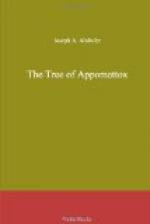“What will Massachusetts say to that? I’ve read Daniel Webster’s speech in reply to Hayne.”
“Oh, Massachusetts, of course, has more people, I’m merely speaking of the average.”
“Nebraska hasn’t been settled long,” said Pennington, “but you just wait. When we get a population we’ll make both Vermont and Massachusetts take a back seat.”
“And that population, or at least the best part of it,” rejoined the undaunted Warner, “will come from Vermont and Massachusetts and other New England states.”
“Sunset and the gap together are close at hand,” said Dick, “and however the mountains of Virginia may compare with those of Vermont, it’s quite certain that the sun setting over the two states is the same.”
“I concede that,” said Warner; “but it looks more brilliant from the Vermont hills.”
Nevertheless, the sun set in Virginia in a vast and intense glow of color, and as the twilight came they entered the gap.
CHAPTER V
AN OLD ENEMY
Despite the brilliant sunset the night came on very dark and heavy with damp. The road through the gap was none too good and the lofty slopes clothed in forest looked menacing. Many sharpshooters might lurk there, and the three colonels were anxious to reach Sheridan with their force intact, at least without further loss after the battle with Colonel Talbot’s command.
The column was halted and it was decided to send out another scouting party to see if the way was clear. Twenty men, of whom the best for such work were Shepard and Whitley, were chosen, and Dick, owing to his experience, was put in nominal command, although he knew in his heart that the spy and the sergeant would be the real leaders, a fact which he did not resent. Warner and Pennington begged to go too, but they were left behind.
Shepard had received a remount, and, as all of them rode good horses, they advanced at a swift trot through the great gap. The spy, who knew the pass, led the way. The column behind, although it was coming forward at a good pace, disappeared with remarkable quickness. Dick, looking back, saw a dusky line of horsemen, and then he saw nothing. He did not look back again. His eyes were wholly for Shepard and the dim path ahead.
The aspect of the mountains, which had been so inviting before they came to them, changed wholly. Dick did not long so much for green foliage now, as a chill wind began to blow. All of them carried cloaks or overcoats rolled tightly and tied to their saddles, which they loosed and put on. The wind rose, and, confined within the narrow limits of the pass, it began to groan loudly. A thin sheet of rain came on its edge, and the drops were almost as cold as those of winter.
Dick’s first sensation of uneasiness and discomfort disappeared quickly. Like his cousin, Harry, he had inherited a feeling for the wilderness. His own ancestor, Paul Cotter, had been a great woodsman too, and, as he drew on the buckskin gauntlets and wrapped the heavy cloak about his body, his second sensation was one of actual physical pleasure. Why should he regard the forest with a hostile eye? His ancestors had lived in it and often its darkness had saved them from death by torture.




